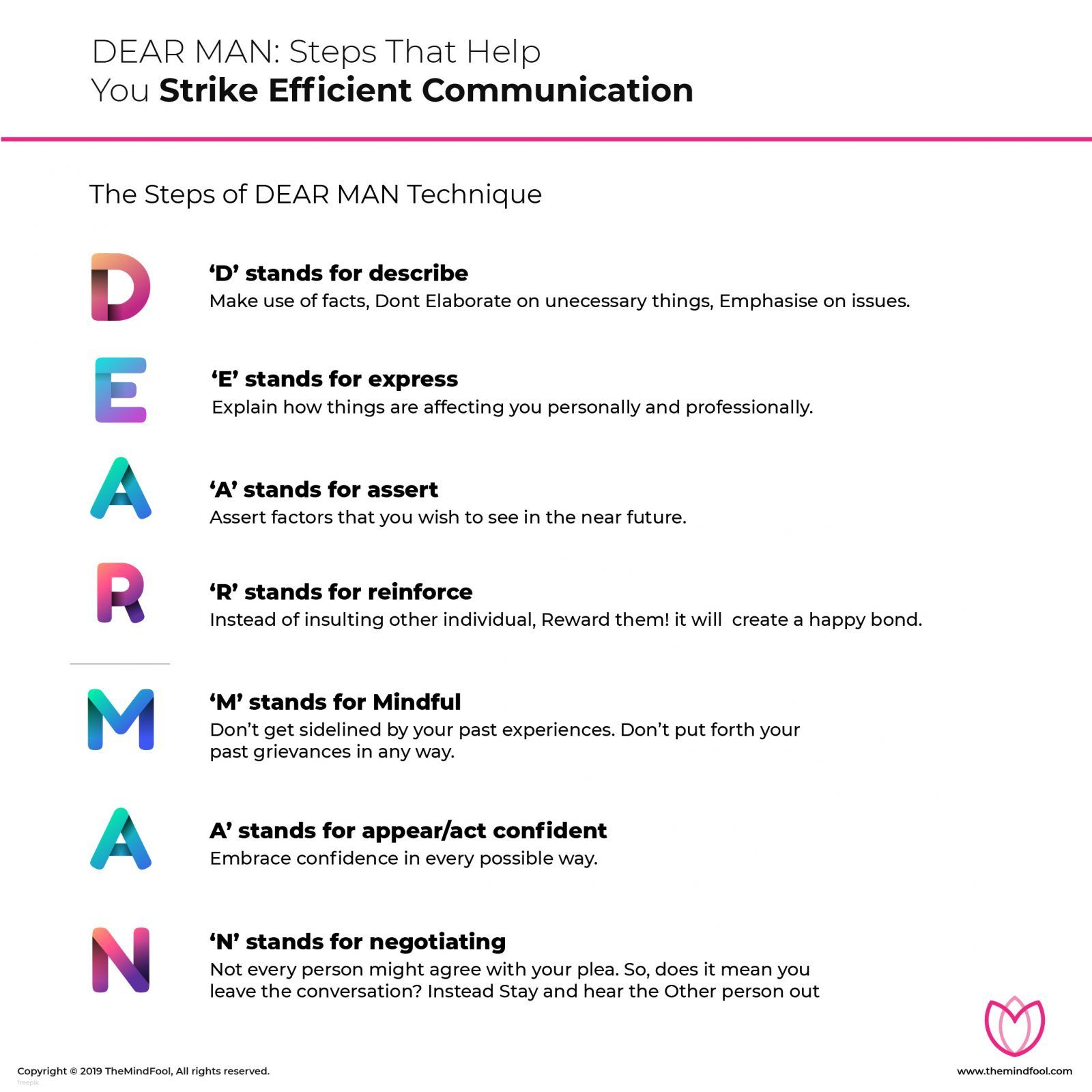5 Tips for Mastering DBT DEAR MAN Skills

The Dialectical Behavior Therapy (DBT) DEAR MAN technique stands as a cornerstone for enhancing interpersonal effectiveness, offering a structured approach to communicating your needs, desires, and boundaries assertively while maintaining relationships. As part of the broader DBT skill set, DEAR MAN equips individuals with the ability to navigate complex social interactions with confidence and clarity. In this comprehensive guide, we delve into five actionable tips to help you master the DEAR MAN skills, ensuring your communication is not only effective but also respectful and persuasive.
1. Describe the Situation Objectively

At the heart of the DEAR MAN technique lies the importance of clear and objective description:
- Stick to Facts: When you’re in a situation that calls for DEAR MAN skills, it’s crucial to avoid letting emotions cloud the narrative. Your goal is to describe what happened using facts. For instance, if you’re discussing a recurring issue with a colleague about punctuality, instead of saying “You’re always late,” you might say, “During our last three meetings, you arrived 10 to 15 minutes later than scheduled.”
- Avoid Judgment: Descriptions should be free from judgment or criticism. This helps maintain a neutral ground from which to move forward in the conversation. Keep your language factual and straightforward, focusing on observable events rather than your interpretation of them.
📝 Note: If you find yourself struggling to keep the description objective, it can be helpful to write down the facts beforehand.
2. Express Your Feelings

Sharing your emotions with ‘I’ statements fosters a non-confrontational environment:
- Own Your Feelings: Using “I feel” statements ensures that you’re expressing how the situation affects you personally, rather than accusing or blaming others. For example, instead of saying “You make me feel undervalued,” you could say, “I feel undervalued when my contributions are not acknowledged.”
- Be Honest: Honesty in expressing your feelings builds trust and authenticity in your communication. It’s about being transparent with your emotional state, which can foster understanding and empathy.
3. Assert Your Needs or Requests

Asserting your needs is where you directly communicate what you’re asking for or the change you’d like to see:
- Be Specific: When you assert your needs or requests, specificity is key. Clearly outline what you would like to happen, leaving little room for ambiguity. If you’re requesting a team member to contribute more to a project, you might say, “I would appreciate it if you could take on the task of finalizing the project’s visual elements by next week.”
- Balance Assertiveness and Respect: Remember, asserting your needs does not mean you should be aggressive or disrespectful. Striking the right balance ensures your message is received positively.
💡 Note: Practice making requests in a way that respects both your needs and the other person’s space.
4. Reinforce Your Request

Reinforcement can encourage the person to respond favorably to your request:
- Positive Reinforcement: Highlight how the fulfillment of your request could benefit the other person. For example, “By setting a clear deadline, both our work-life balance can improve.”
- Mutual Gain: Emphasize the mutual benefit or positive outcome of your request to foster a win-win scenario, encouraging cooperation and understanding.
After reinforcing your request, maintaining the conversation’s effectiveness involves the other components of DEAR MAN:
5. Mindful, Appear Confident, and Negotiate

The “MAN” in DEAR MAN represents three essential skills:
- Stay Mindful: Maintain your focus on your goals. Avoid getting sidetracked by the other person’s reactions or attempts to change the subject. Politely but firmly bring the conversation back to your main points.
- Appear Confident: Even if you’re not feeling entirely confident, your body language and tone should project assurance. This includes making eye contact, speaking clearly, and using gestures that reinforce your message.
- Be Willing to Negotiate: Recognize that not every request can be met immediately or in full. Showing a willingness to find a middle ground or to compromise can lead to a more satisfactory outcome for all involved.
By integrating these tips into your interpersonal interactions, you enhance your communication skills, ensuring your needs are heard, respected, and ideally, met in a constructive manner.
To conclude, mastering DBT DEAR MAN skills is about fostering a balance between assertiveness, empathy, and effective communication. The key takeaway is that with practice, anyone can learn to communicate their needs and desires in a way that preserves relationships while advocating for oneself. Remember, the objective isn’t just to get your needs met but to do so in a way that respects both yourself and others. Through this lens, DEAR MAN becomes not just a tool but a philosophy for interpersonal interactions, enhancing relationships, and personal well-being.
Can DEAR MAN skills be used in all types of relationships?

+
Yes, DEAR MAN skills are versatile and can be applied in personal, professional, or casual relationships to enhance communication and ensure your needs are met respectfully.
What if the person I’m communicating with is not responsive to DEAR MAN?

+
If someone does not respond to DEAR MAN skills, it might be necessary to adjust your approach or even reassess the relationship’s dynamics. Sometimes, communication is not effective due to deeper issues that require other strategies or external help.
How can I improve my assertiveness without coming off as aggressive?

+
Focus on your body language and tone. Use ‘I’ statements to express your needs, maintain a calm demeanor, and be open to listening and understanding the other person’s perspective as well.